
Studia Theodisca
Scope & Guideline
Connecting Ideas, Inspiring Narratives
Introduction
Aims and Scopes
- Interdisciplinary Literary Analysis:
The journal promotes an interdisciplinary approach to literary studies, examining texts through various lenses such as philosophy, politics, and history. This perspective allows for a deeper understanding of the cultural and intellectual currents that shape literary production. - Cultural and Historical Contextualization:
A consistent focus on situating literary works within their historical and cultural contexts is evident. The journal explores how literature reflects and influences societal norms, political ideologies, and cultural movements, particularly in the German-speaking world. - Exploration of Migration and Identity:
Recent publications highlight themes of migration and identity, showcasing how literature addresses these complex issues. The journal provides a forum for discussions on cultural exchange and the impact of diasporic experiences on literary expression. - Philosophical and Aesthetic Inquiry:
'Studia Theodisca' emphasizes philosophical inquiries into aesthetics and the nature of art, as seen in discussions surrounding figures like Goethe and Schiller. This focus enriches the understanding of German literature's role in philosophical discourse. - Focus on 19th and 20th Century Literature:
The journal exhibits a strong emphasis on 19th and 20th-century literature, reflecting on the evolution of literary forms and themes during these periods, particularly in response to socio-political changes in German-speaking countries.
Trending and Emerging
- Engagement with Migration and Diaspora:
There is a noticeable increase in studies focusing on migration and the experiences of diasporic communities. This emerging theme underscores the relevance of literature in exploring identity, belonging, and cultural exchange in an increasingly globalized world. - Post-Colonial and Hybrid Identities:
The exploration of post-colonial themes and hybrid identities is gaining traction. Recent works analyze how literature reflects and critiques colonial legacies and the complexities of identity in post-colonial contexts, broadening the scope of German literary studies. - Critical Approaches to Memory and Trauma:
Emerging scholarship is increasingly focused on memory, trauma, and the reworking of historical narratives, particularly concerning the Nazi past. This trend highlights literature's role in processing collective memory and confronting historical injustices. - Intersections of Literature and Politics:
A growing trend is the examination of literature's relationship with political discourse, particularly in times of crisis. Recent publications investigate how literary works respond to and critique political systems and ideologies, reflecting contemporary societal challenges. - Philosophical Underpinnings in Literature:
There is an emerging interest in the philosophical dimensions of literature, particularly in relation to aesthetics and ethics. Scholars are increasingly analyzing how literary works engage with philosophical ideas, enriching the discourse surrounding German literature.
Declining or Waning
- Traditional Historical Narratives:
There seems to be a waning interest in traditional historical narratives that focus solely on chronological retellings of events without critical engagement. This decline may indicate a shift towards more nuanced interpretations that incorporate multiple perspectives and voices. - Purely Formalist Literary Criticism:
The emphasis on purely formalist approaches to literature appears to be decreasing. Scholars seem to be moving towards more contextualized readings that consider the socio-political implications of literary works, rather than focusing exclusively on form and structure. - Nationalistic Literature Studies:
Themes centered around nationalistic interpretations of literature are becoming less prominent. This may reflect a growing recognition of the complexities of identity and the interconnectedness of cultures, moving away from rigid national frameworks. - Biographical Criticism:
The focus on biographical criticism, which examines authors' lives as a primary avenue for understanding their works, appears to be diminishing. This trend suggests a shift towards examining texts independently of their authors' personal narratives.
Similar Journals

TWENTIETH CENTURY LITERATURE
Connecting Past Insights with Future DiscoveriesTWENTIETH CENTURY LITERATURE is a renowned journal published by Hofstra University Press, dedicated to the exploration and analysis of literature and literary theory from the twentieth century. With a focus on both established and emerging voices in the field, this journal serves as an essential resource for researchers, professionals, and students who seek to deepen their understanding of significant literary movements and trends. The journal holds an impressive Q2 category ranking in Literature and Literary Theory as of 2023, showcasing its impact and relevance in the academic community. Though not an open access journal, it provides valuable insights and scholarly discussions that contribute to ongoing debates in literature studies. Covering a converged period from 2002 to 2014 and continuing from 2016 to 2024, TWENTIETH CENTURY LITERATURE positions itself as a pivotal platform for thought-provoking literature critique and scholarly inquiry, making it an indispensable addition to any academic library or personal collection.
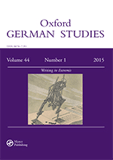
OXFORD GERMAN STUDIES
Navigating the Rich Landscape of German LinguisticsOXFORD GERMAN STUDIES, published by Routledge Journals, Taylor & Francis Ltd, is an esteemed academic journal dedicated to the exploration and scholarly examination of German literature and linguistics. With an ISSN of 0078-7191 and E-ISSN of 1745-9214, this journal has been in circulation since 1966, offering researchers a unique platform for critical discourse, innovative research, and interdisciplinary dialogue. It holds a significant position in the academic landscape, being categorized in the Q4 quartile for Linguistics and Language and Q3 for Literature and Literary Theory as of 2023. Despite lacking open-access options, the journal thrives in providing invaluable insights, aiming to bridge historical contexts with contemporary perspectives on German studies. It serves as an essential resource for scholars, professionals, and students eager to deepen their understanding of Germanic languages and literature. Located in Abingdon, United Kingdom, the journal continues to uphold its mission of advancing knowledge and fostering scholarly discussions in the rich field of German studies.

ZEITSCHRIFT FUR DEUTSCHE PHILOLOGIE
Contributing to the Evolution of German Literary DiscourseZEITSCHRIFT FUR DEUTSCHE PHILOLOGIE is a prestigious academic journal dedicated to the exploration of German philology, literature, and linguistic theory, published by Erich Schmidt Verlag. With a commitment to advancing scholarship in the field, it showcases a diverse range of research articles, critical essays, and theoretical explorations that contribute to the understanding of German language and its literary heritage. While the journal has experienced fluctuating coverage in indexing databases such as Scopus, it remains a valuable resource for researchers and students alike, offering insights into relevant academic discourse. Despite not being openly accessible, the journal continues to serve as an important platform for academic exchange and innovation, allowing scholars to engage with the complexities of language and literature. Its rigorous peer-review process ensures that only high-quality research is published, making it essential reading for anyone invested in the humanities.
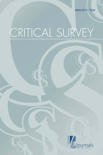
Critical Survey
Decoding the Dynamics of Literature and SocietyCritical Survey, published by BERGHAHN JOURNALS, is a distinguished academic journal that focuses on the dynamic intersections of Cultural Studies and Literature and Literary Theory within the arts and humanities landscape. With an ISSN of 0011-1570 and E-ISSN 1752-2293, this journal serves as a crucial platform for scholars, offering original research and critical essays that delve into contemporary cultural and literary debates. Based in the United Kingdom, it enjoys a solid reputation as evidenced by its 2023 Scopus rankings, placing it in the Q3 category for Cultural Studies and Q2 for Literature and Literary Theory. While it does not currently offer open access options, the journal is committed to maintaining high academic standards and fostering intellectual exchange through its published content, inclusive of articles that span a range of topics relevant to critical survey methodologies. As it continues to converge from 2012 to 2024, Critical Survey remains an invaluable resource for researchers, professionals, and students engaged in the evolving discourse of cultural and literary analysis.
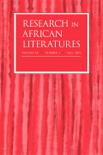
RESEARCH IN AFRICAN LITERATURES
Connecting Cultures through African Literary ScholarshipRESEARCH IN AFRICAN LITERATURES is a prestigious peer-reviewed journal published by Indiana University Press, dedicated to the critical exploration of African literary traditions, cultures, and texts. With an ISSN of 0034-5210 and an E-ISSN of 1527-2044, this journal stands out in the field of literature and literary theory, currently ranking in the 80th percentile of its category according to Scopus, making it a significant platform for scholars and researchers alike. Since its establishment, the journal has evolved through converged volumes from 2002 to 2024, consistently fostering innovative discourse and interdisciplinary approaches that illuminate the complexities of African narratives. Although it does not offer open access, the journal is integral for anyone engaged in African studies, providing critical insights that are essential for understanding the broader implications of literature within diverse cultural contexts. The journal's commitment to high standards of scholarship is reflected in its Q3 quartile ranking and its influential contribution to contemporary literary dialogue.
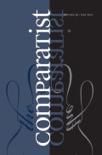
Comparatist
Connecting Diverse Voices in Critical TheoryComparatist is a distinguished journal published by the University of North Carolina Press, focusing on the interdisciplinary exploration of comparative literature, culture, and critical theory. With its ISSN 0195-7678 and E-ISSN 1559-0887, this journal serves as an essential platform for scholars and practitioners to engage with diverse literary traditions and foster dialogues across cultural boundaries. Targeted at researchers, professionals, and students, Comparatist publishes original research articles, critical essays, and theoretical perspectives that contribute significantly to the understanding of comparative studies in literature. The journal is committed to advancing the field by offering fresh insights and fostering intellectual exchange among a global audience. Although it currently does not offer Open Access options, Comparatist maintains a robust reputation within its discipline, making it an invaluable resource for those seeking to deepen their understanding of comparative methodologies and literary discourse.
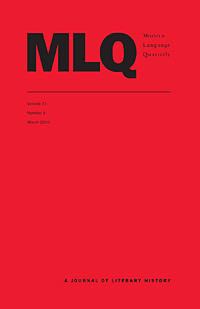
MODERN LANGUAGE QUARTERLY
Illuminating the Intersection of Language and Society.MODERN LANGUAGE QUARTERLY, published by DUKE UNIVERSITY PRESS, stands as a premier journal in the field of Literature and Literary Theory, recognized for its intellectual rigor and scholarly contributions. With an impressive Scopus ranking of #156 out of 1106 in its category, the journal showcases an 85th percentile standing, indicating its significant impact within the academic community. The journal, with ISSN 0026-7929, focuses on critical analysis, literary theory, and the intersection of language and culture, making it an essential resource for researchers, professionals, and graduate students alike. As it converges from 1996 to 2024, MODERN LANGUAGE QUARTERLY continues to uphold its tradition of excellence in literary scholarship, contributing to the advancement of knowledge and fostering a deeper understanding of literature's role in society. With its Q1 ranking in 2023, this journal represents the forefront of literary studies, providing a vibrant forum for the exchange of ideas and innovative research in the humanities.

Anales de Literatura Hispanoamericana
Connecting Scholars Through the Lens of Hispanic LiteratureAnales de Literatura Hispanoamericana, published by UNIV COMPLUTENSE MADRID, SERVICIO PUBLICACIONES, is a prominent journal dedicated to the field of Hispanic literature and literary theory. With a history of publication spanning from 1996 to 2023, this journal provides an essential platform for scholars and researchers exploring diverse aspects of literature within the Hispanic cultural context. Though it currently operates without an open-access model, its scholarly contributions are vital for advancing the understanding of literary phenomena in Spanish-speaking countries. As a Q3 ranked journal in the Literature and Literary Theory category, it engages a global audience interested in high-quality research, and its Scopus ranking places it among the notable publications in the arts and humanities. The journal aims to foster interdisciplinary dialogue, showcasing innovative research and critical analyses that enhance the appreciation of Hispanic literary heritage. Whether you are a seasoned researcher or an emerging scholar, Anales de Literatura Hispanoamericana serves as a crucial resource for advancing your understanding of the rich tapestry of Hispanic literature.

LINKS Rivista di letteratura e cultura tedesca
Advancing Scholarly Dialogues in German StudiesLINKS Rivista di letteratura e cultura tedesca is a distinguished academic journal dedicated to the exploration and analysis of German literature and culture. Published by FABRIZIO SERRA EDITORE, this journal serves as a vital platform for researchers, professionals, and students who wish to delve into the intricacies of German cultural studies across various time periods and genres. With both ISSN 1594-5359 and E-ISSN 1724-1685, LINKS emphasizes scholarly rigor and multidisciplinary approaches, providing a space for innovative research and critical perspectives. Although the journal is not open access, it still plays a crucial role in advancing the understanding of German literature within the international academic community, contributing significantly to the field's ongoing dialogue and evolution. For those interested in enhancing their knowledge and engagement with contemporary issues in German studies, LINKS represents an essential resource.

Dirasat Hispanicas-Revista Tunecina de Estudios Hispanicos
Unveiling New Perspectives in Hispanic StudiesDirasat Hispanicas-Revista Tunecina de Estudios Hispanicos is a pivotal academic journal published by UNIV TUNIS MANAR, INST SUPERIEUR SCIENCES HUMAINES TUNIS, dedicated to the exploration and analysis of Hispanic studies within the broader context of history, linguistics, and literature. Established in Tunisia, this journal has transitioned to an Open Access model since 2014, promoting the dissemination of knowledge and fostering scholarly exchange among researchers, professionals, and students globally. With its ISSN 2286-5977 and esteemed recognition in various categories, including Q4 in History and Linguistics and Q3 in Literature and Literary Theory, Dirasat Hispanicas strives to bridge gaps in Hispanic scholarship by inviting diverse critical perspectives and innovative research. While its Scopus rankings reflect an evolving presence in the academic landscape, the journal remains committed to enhancing the visibility and impact of Hispanic studies. The journal continues to encourage submissions that contribute to its mission of intellectual advancement, making it an essential resource for those engaged in the rich tapestry of Hispanic cultural and linguistic heritage.